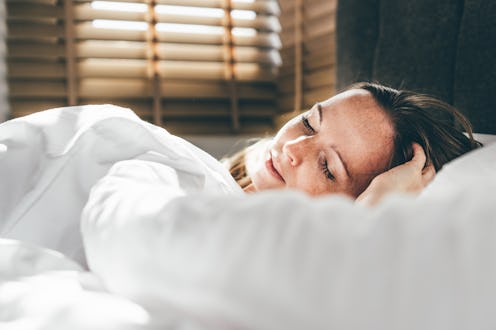Fashion
Truths To Know About Sleeping In Makeup

If you’re on the hunt for some New Year’s beauty resolutions to try, perhaps it’s finally time to stop sleeping in your makeup. And yes, we’ve all definitely indulged in this at some point, but chronically dozing in your foundation can be one horrendous beauty habit that can severely damage the health of your skin.
“Continuously sleeping in your makeup can cause clogged pores, breakouts, irritation and rough skin texture, but most importantly, this habit leads to premature signs of aging and bacterial buildup,” says board certified dermatologist and RealSelf advisor Dr. Joel Schlessinger via email. “Neglecting to remove eye makeup can also cause dryness, redness, irritation and infection.”
You've probably heard how bad snoozing in your foundation really is, but I can't stress enough on how important it is to remove that stubborn liner and mascara before bed too. In failing to take off a full painted face before you snooze, you can definitely expect to see more beauty disasters than you probably can handle. Yikes.
Not entirely convinced on the benefits of makeup removal each and every night? Here’s some eye-opening truths to consider the next time you’re about to skip out on the makeup remover wipes.
1. It Affects Every Skin Type Negatively
Listen, I'm not here to judge if you accidentally sleep in your makeup a couple times, but continuing to do so overtime is one bad beauty blunder you don’t want to routinely make a habit out of. Poorly removed makeup can not only clog pores, but can make certain skin conditions only worse to deal with.
“Each type of makeup affects skin a little differently,” explains Dr. Schlessinger through email. “If you have specific skin concerns like rosacea or hormonal acne, you might see a flare up in the affected areas, if you forget to take your makeup off."
Plus, if your skin is on either the oily, or acne-prone side, it’s likely that you can see pimples and breakouts the very next day. That’s why it’s best for all skin types to treat their skin with care, and remove makeup before you snooze.
“Different skin types could account for less frequent breakouts,” Dr. Schlessinger adds. “Someone who has sensitive, oily, or acne-prone skin, is obviously more likely to see blemishes the next morning.”
2. Foundation Is The Worst Product To Sleep In
Sleeping in any kind of makeup is ultimately harmful to the skin, but there are products which ultimately can be more damaging to your complexion if they are left on for too long. Foundation, for example, can cause acne flare ups and fine lines if not properly removed.
“Foundation is the kind of product that needs to be taken off every day especially if it is oil based,” explains New York-based dermatologist Dr. David Bank, through email. “When products like these aren’t properly removed, they result in the breakdown of collagen, wrinkles, clogged pores, and acne flare-ups.”
3. But Eye Makeup Can Mess You Up Too
In addition to pore-clogging foundations, eye makeup such as mascara and eyeliner proves to be equally damaging, as leftover eye products can cause irritation and unwanted eye infections. And in addition to irritating inflammation, eyelashes can also be damaged from left-on mascara.
“Wearing eye makeup overnight can also be hard on your eyelashes,” says Dr. Schlessinger. “Left-on mascara can cause eyelashes to become brittle, break easily and even shed faster.”
4. Sleeping In Lipstick Makes Chapping Worse
Even sleeping in lipstick has it’s disadvantages, especially since many formulas contain drying waxes. If left on overnight, your favorite glosses and lipsticks can lead to clogged pores on the skin surrounding your lips.
“Many lipsticks are very drying, and wearing lipstick on a daily basis can zap lips of their natural moisture,” adds Dr. Schlessinger. “Removing lipstick every night and applying a hydrating lip balm will help moisturize, soften and smooth chapped lips.”
5. How You Remove Is Up To You
For proper and effective makeup removal, it’s best to select a product based on the type of makeup you already wear. Dr. Schlessinger advises that oil-based or cleansing water formulas are best for breaking down water-resistant mascaras and eyeliners.
But Schlessinger also finds that makeup removing wipes can be a lifesaver to those who want a quick way for removing makeup. But while products like these are definitely convenient, portable wipes shouldn’t really substitute a real cleanse. However, using makeup dissolving wipes like these, are surely better than sleeping in heavy foundation, bronzers and eye shadows.
“Most wipes are designed to remove makeup from the entire face so if you’re using them on delicate areas like around the eyes, make sure the formula is gentle enough for use on this area as well,” he says. “It’s still better to use makeup wipes instead of falling asleep with a full face of makeup, because they remove a good portion of makeup, oil and other debris.”
So pick up that pack of makeup wipes on your way home tonight, and never pass out with makeup on again.
Images: Getty Images (6)